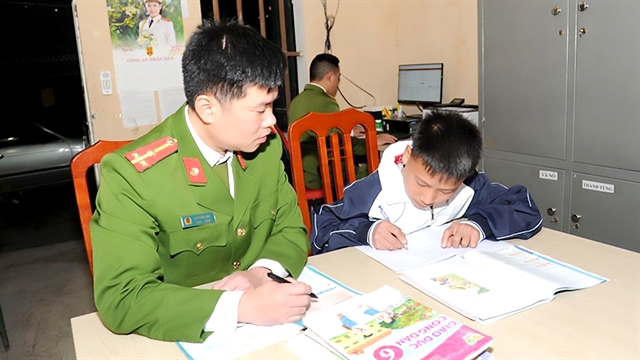 Society
Society

Niêm Sơn Commune police station in Mèo Vạc District, in the northern province of Hà Giang, has become home to 15-year-old Ly Mí Hồng ever since five commune police officers adopted him last year.

|
| Senior Lieutenant La Tuấn Anh, a police officer of Niêm Sơn Commune, Mèo Vạc District, helps adoptive son Ly Mí Hồng study. — Photo nhandan.vn |
HÀ GIANG — Niêm Sơn Commune police station in Mèo Vạc District, in the northern province of Hà Giang, has become home to 15-year-old Ly Mí Hồng ever since five commune police officers adopted him last year.
Hồng and his siblings have been earning a living since an early age, as their father died early and their mother left with their grandparents who were old and weak.
The Mông ethnic children took care of each other until Hồng's older sisters and brothers got married, but they were too poor to feed their own families and the little brother Hồng too.
Hồng said that at age of ten, he started working at markets to buy meals. However, on many days he failed to get any food.
Knowing about Hồng's circumstances, the police in Niêm Sơn Commune adopted him, offering him not only a home but also the care and love of foster fathers.
Lieutenant Colonel Vũ Ngọc Chiến, head of police of Niêm Sơn Commune, said that when Hồng first arrived at the police station, he was undernourished, stunted, and much smaller than his peers.
“To make up for the lack of love from his family, police officers look after and teach Hồng wholeheartedly," he said, adding that they spent time helping Hồng with his schooling, behaviour, communication, and daily life skills.
Instead of working at markets, Hồng now attends grade 6 at the Ethnic Semi-boarding High School in the commune.
"When living with police officers, Hồng has made much progress not only in awareness, self-reliance, integration in life but also good academic results," said Hồng's teacher Đinh Công Nguyên.
In Nghĩa Thuận Commune of the same district, commune police also adopted a local disadvantaged child.
Vù Thị Sinh lost her mother and does not know her father. Her relatives are unable to support her properly because of their poverty.
Sinh is a shy and quiet girl but when she sees her foster fathers, her face lights up.
Every weekend, commune police officers pick Sinh up at the police station and buy her new clothes, food and essentials. They then have lunch together.
Major Vàng Đình Thánh, head of police of Nghĩa Thuận Commune, said that they were now offering financial and spiritual support to Sinh so that she could overcome difficulties and continue going to school.
The police also cooperated with teachers to oversee and help her, Thánh said.
As the commune police station is based in a small post office, the police could not offer Sinh a place to stay, Thánh said.
From the 'commune police adoption' model in Niêm Sơn Commune, the Hà Giang Province's Police directed the police of districts and cities to expand the model.
Senior Lieutenant Colonel Mai Trọng Vĩnh, deputy head of the Party and Political Affairs Division, Hà Giang Province's Police, said that the adoption and sponsorship by the communal police force show humanity and realise the motto "when the people need, the police will help."
That model also helps raise public awareness and responsibility in caring for and taking care of orphaned disadvantaged children.
The model of 'commune police adoption' in Hà Giang Province was formed spontaneously, so there are difficulties in expanding it, Vĩnh said.
Currently, most of the adopted children go to local primary or secondary schools. But, when they go to high school, they have to travel further and need more support, Vĩnh said.
He suggested that the Hà Giang provincial police should have specific instructions and orientations for the model, especially the scope of support and career orientation for the adopted children.
To raise and support orphans, besides the funding that commune police officers deduct from their salary, the community's cooperation and support are needed, he said. The commune police force also needs specific guidance in mobilising social resources, as well as managing and using the supported funds. — VNS




